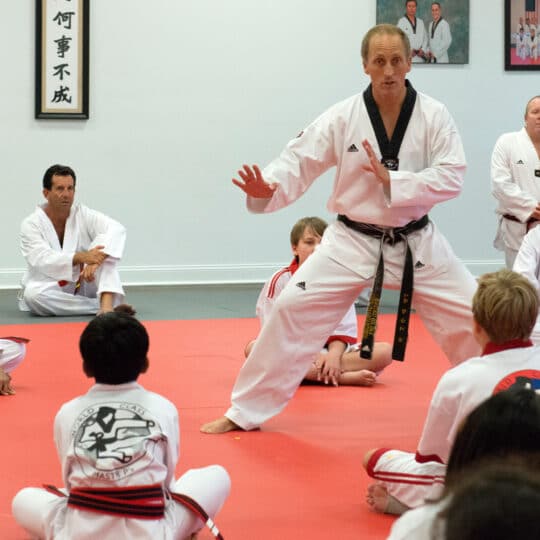Taekwondo Etiquette in the Dojang

Etiquette is an important part of Taekwondo. It is part of how we show respect for our trainers and others in the Dojang, and it also promotes the discipline that is important for a well rounded Taekwondo practice.
Much of the etiquette of Taekwondo derives from Japanese culture, where Taekwondo was established, so it may be unfamiliar at first. Through practice, students will quickly become second nature and a natural part of your Taekwondo practice.
Steps for Good Etiquette in Taekwondo
As you begin learning Taekwondo, your instructor will guide you through the different etiquette that you will need to perform while you are practicing Taekwondo. In the meantime, the basics of Taekwondo etiquette that you should expect in the Dojang include:
- Bowing – Bowing is a key sign of respect in Taekwondo. You will typically bow at the beginning and end of practice sessions. You will also bow to the association flags and your instructor. To bow properly, you should have your heels together, hands at your side, and bend forward from the waist about 45 degrees.
- Terms of Address – You should always use formal address with your instructors and call them Sir, Ma’am, or Miss. You should also address all black belts of higher rank than you with respectful address as well.
- Sitting – When asked to sit, the proper way is with your legs crossed in front of you or kneeling and sitting back on your heels. You should never sit with your legs splayed out in front of you as that is considered disrespectful.
- No Shoes on the Mat – Unless you have martial arts shoes, you should remove all footwear before stepping onto the mat.
- Punctuality – Arriving and leaving on time shows respect to your instructor and classmates. It will also limit interruptions to class.
- Maintain Your Uniform – Your uniform and belt should be kept clean and in good condition. If you must adjust your uniform during class, it is polite to turn away from others but never turn your back on the instructor to take care of any adjustments.
- Be Generally Polite – Although some etiquette may be specific to Taekwondo, general politeness, such as not interrupting, staying focused, avoiding bad language, staying calm, and behaving kindly towards others is still important in the Dojang.
At Master P’s World Class Tae Kwon Do, the etiquette that our instructors and students follow creates a disciplined atmosphere from which our students can learn and gives them the tools to succeed in Taekwondo, whether it be in competitions or in daily practice. To start learning Taekwondo at our studio in West Chester, sign up online for a week of free classes.